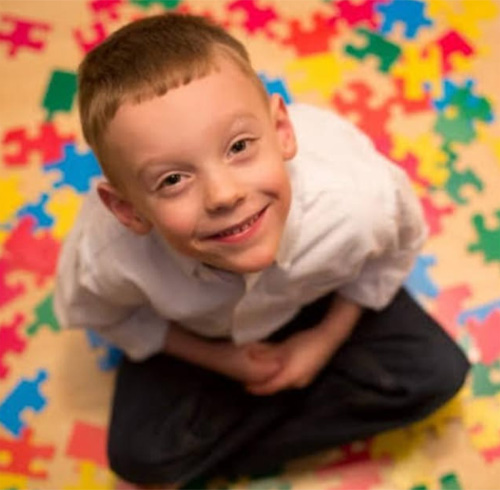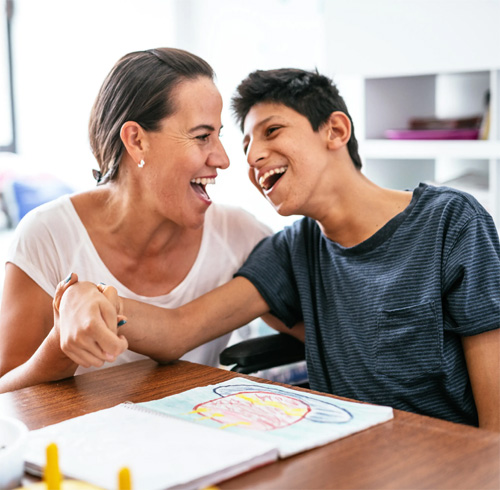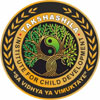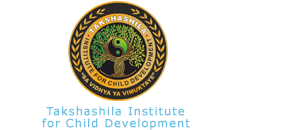Welcome to Takshashila Institute for Child Development
9301405602, 8225906829
About Various Disabilities

Early childhood is the period from prenatal development to eight years of age. It is a crucial phase of growth and development because experiences during early childhood can influence outcomes across the entire course of an individual’s life. For all children, early childhood provides an important window of opportunity to prepare the foundation for life-long learning and participation, while preventing potential delays in development and disabilities. For children who experience disability, it is a vital time to ensure access to interventions which can help them reach their full potential.
Delay in development occurs when the child fails to attain developmental milestones as compared to peers from the same population. It is caused by impairment in any of the following distinct domains, such as gross and fine motor, speech and language, cognitive and performance, social, psychological, sexual, and activities of daily living (ADL). It can be isolated (involving a single domain), multiple (involving two or more domains), or global (affecting most developmental areas). In order to avoid long term disability, early detection, and intervention is warranted.
It’s so important to learn about the early symptoms of autism spectrum disorder (ASD), attention deficit hyperactivity disorder (ADHD), Intellectual Disability (ID) in pre-school age children and about the ways these disorders can impair a child’s behaviour and learning.
When parents, caregivers, and teachers are aware of and educated about these disorders, they can be more proactive in getting positive strategies in place and intervening before the child develops a pattern of negative behaviours or damaged self-esteem. Early intervention may also potentially prevent the emergence of further symptoms and secondary conditions such as anxiety or oppositional defiant behaviours.
Early intervention refers to services and supports that help young children with developmental delays. You don’t have to wait until your child starts school to ask about learning differences or developmental delays. Even infants and toddlers can get help through early intervention. A child must be 3 years old to qualify for an IEP.
In our Takshashila,we are practicing Transdisciplinary models of early intervention that aims to provide more family-centered, coordinated, and integrated services to meet the complex needs of children with disabilities and their families. Reaserch has showed that the transdisciplinary approach (TA) has been recognized as a best practice for early intervention . In contrast to other service delivery approaches, TA is considered to reduce fragmentation in services, reduce the likelihood of conflicting and confusing reports and communications with families, and enhance service coordination

Autism Spectrum Disorder (ASD) ------
Autism spectrum disorders are neurodevelopmental disorders, meaning they are caused by abnormalities in the way the brain develops and works. People with autism spectrum disorders have problems in social behaviour and communicating with others; they tend to engage in solitary interests and activities which they do repetitively. In most cases, autism spectrum disorders become apparent during the first 5 years of a person’s life. They begin in childhood and tend to persist into adolescence and adulthood.
Sign and Symptoms ------
Every person with an autism spectrum disorder has a unique pattern of behaviour, but there are some common signs and symptoms:
– Communication problems (difficulty using or understanding language) such as delayed speech development and limited vocabulary for their age, repeating a set of words or phrases, focusing attention and conversation on a few topic areas, monotonous and flat speech.
– Difficulty in social interaction. This includes having trouble in making friends and interacting with people, difficulty understanding facial expressions, difficulty understanding their own and other people’s emotions, not making eye contact, not wanting to be cuddled, not answering when called or refusing to do things when asked.
– Repetitive behaviours and following strict routines. This may include repetitive body movement such as hand flapping and repetitive motions with objects like spinning the wheels of a toy car, performing activities that could cause self-harm such as biting or head-banging, sticking to the same routine every day and having difficulty adjusting to even minor changes.
– Sensory sensitivity. Being over- or under sensitive to sounds, lights, touch, tastes, smells, pain and other stimuli.
Prevalence:
According to an analysis published by centres for disease control and prevention (CDC)
– About in 1 in 36 children has been identified with autism spectrum disorder.
– ASD is reported to occur in all racial, ethnic and socioeconomic group.
– ASD is nearly 4 times more common among boys than among girls.

Attention Deficit Hyperactivity Disorder ------
Attention deficit hyperactivity disorder (ADHD) is one of the most common mental disorders. It affects 5–8% of children, mostly boys, and often lasts into adulthood. ADHD affects a child’s learning and their functioning in daily life.
It has three main features: ------
inattention – not being able to stay focused
– hyperactivity – excess movement that is not appropriate to the setting or excessive fidgeting, tapping or talking
– impulsivity – acting hastily without thinking, and in a way that may have high potential for harm.
Sign and Symptoms ------
The symptoms of ADHD are not the same among all children. The condition can range from mostly poor attention to mostly hyperactivity and impulsivity or a combination of both. The symptoms may occur sometimes in children who do not have the condition; the difference in children who do is that the symptoms are frequent, severe and cause problems in functioning:
– Children with poor attention may often be forgetful, easily distracted, not able to stay focused on a task and finish it, seem not to be listening, disorganized, take time to start doing things and lose their personal possessions frequently.
– Children with hyperactivity may often be restless, fidgety, full of energy or “always on the go”, loud, continuously chattering, unable to stay seated (in the classroom, workplace, etc.), running about or climbing in inappropriate places and unable to play or do leisure activities quietly.
– Children with symptoms of impulsivity may often do things without thinking, have difficulty waiting for their turn in games or in a queue, interrupt people in conversation, blurt out answers before the question is finished, look intrusive and start using other people’s things without permission.

Intellectual Disability ------
Intellectual disability is when a child has major difficulty or delay in acquiring skills across most developmental areas including motor (movement) skills, communication and speech, social interaction, play and learning (cognitive skills).
Lower intelligence limits the ability of an affected child to learn and function at the expected level. There are different degrees of intellectual disability, ranging from mild to profound.
Sign and Symptoms ------
The more severe the intellectual disability, the earlier the affected child will show symptoms. The main feature is delay in learning and doing things that children are expected to do when they reach a certain age. For example,
– sit up, crawl, or walk later than other children
– learn to talk later, or have trouble speaking
– find it hard to remember things
– have trouble in communicating their wants and understanding social rules
– have trouble seeing the results of their actions
– have trouble solving problems
– have trouble doing everyday tasks such as dressing up, eating without help, learning at school, handling money and working independently.

